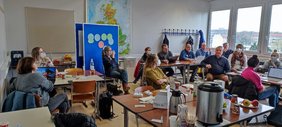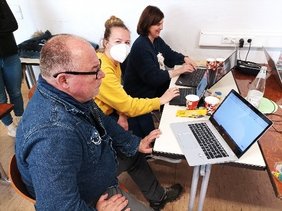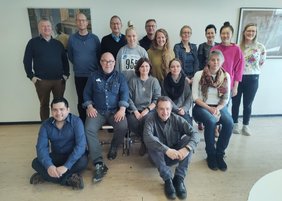Im April 2022 trafen sich 18 Lehrkräfte des EU-Partnerschaftsprojekts DigiVET Readiness am OSZ IMT, um gemeinsam in national gemischten Teams den Einsatz kollaborativer digitaler Medien für den Unterricht in Berufsschulen zu erproben. Exemplarisch sollten Lehrkräfte sich den Anforderungen aussetzen, die sie selbst von Lernenden erwarten, wenn diese im Unterricht mit Hilfe digitaler Medien kurze Projektaufgaben kollaborativ bearbeiten sollen. Trotz der sehr verschiedenen institutionellen Rahmenbedingungen der Teilnehmer, großen Unterschieden in bereits vorhandenen Kenntnissen und Kompetenzen, war dieser Workshop äußerst intensiv, bereichernd und vermittelte weiterführende pädagogisch-didaktische Hinweise für den Einsatz kollaborativer Medien im Unterricht.
One of the major advantages and lasting impacts of any Erasmus+ cooperation could be described as “joining divergent cultures of learning”. Based on this spirit of curiosity, engagement, and ability to compromise 18 teachers from the four participating partner countries joined their experiences and mutual concerns during the second Training Event organized at the Berlin Oberstufenzentrum for Information Technology and Medical Device Technology this April, focusing on one of the central dimensions to enhance teaching and learning at vocational colleges: Developing competences for collaborative and cooperative learning.
As many educational as well as sociological studies and research have indicated the ongoing changes within industry and services require new competences to cooperate and collaborate on the level of customer related businesses. The impact of the prolonged periods of closed schools, colleges and the enormous increase of tasks being transferred into home office, have also lead to challenging traditional settings of teaching and learning within educational institutions: Teamwork and project based learning which is not only target driven but in its very essence is rooted in sharing, adding and selecting relevant information and drawing consensus based conclusions have become vital and central elements of vocational qualifications. The ability to enter into collaborative teaching depends, of course, on the availability of a variety of hard- and software within educational institutions. But it equally depends on the teacher´s self-confidence , self-esteem, experience, and their motivation to risk crossing the boundaries of their well-established fields of knowledge.
Based on the decision of the steering team the workshop in Berlin wanted to explore, how teachers could increase their cooperation and collaboration in view of team building among the staff, to create confidence and skills among teachers, change their attitudes (and minimize fears) towards digital media. For this reason, we started the LTT with a self-assessment of our own digital competences, employing SELFIE for TEACHERS (cf. educators-go-digital.jrc.ec.europa.eu/). After discussing the tool and its relevance for teachers, a short presentation was delivered to create awareness about strategies on how to successfully work in collaborative groups. For the next three days, the cross-national teams were busy creating presentations on either “The return of artifacts to former colonies” or “Solutions to the energy crisis”. The protocols of the group’s sessions provided stimulating examples of how previous experiences, sharing of expertise on various applications (e.g., Mural, Padlet, Zumpad, Jamboard, Mentimeter, Canva, Flickr, Emaze etc.) were creatively used to reach at a common product. And indeed, we listened to marvelous examples of extremely informative and stimulating results of collaboration! Each one a delightful masterpiece.
Discussing the overall outcome of this meeting, the participants agreed that
- teachers should be given more time to explore and share new tools, i.e., new formats of explorative further teacher trainings need to be introduced,
- collaborative teamwork requires an open and relaxed attitude to be able to listen, share strategies and continuously evaluate the common work process of the group,
- spatial arrangements for flexible and supportive workspace are essential to allow for differentiated time for individual as well as group work,
- a self-regulated mixture of individual reflection on possible outcomes and strategies and the ability to methodologically organize the group exchange supports the basis of innovative learning with digital tools.
These general characteristics of teamwork become even more important when digital tools need to be explored first, expert knowledge must be shared, and different levels of digital competence embark on a common task. As educators we must keep in mind that among our students, we will also find those who are more advanced, specialized and sometimes experienced in leading and/or supporting collaborative learning. Without providing further teacher trainings like the one in Berlin, we may not be able to fully grasp the challenges as well as the amazing chances which collaborative learning can enfold.
(Matthias Döbler, OSZ IMT May 2022, Erasmus+ grant: 2020-1-NO01-KA226-VET-094087)






